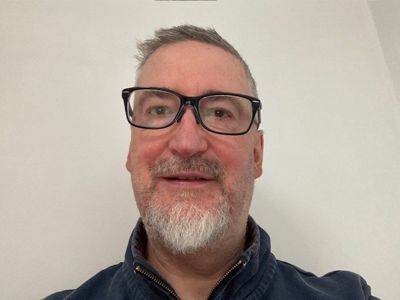“Reaching out was the best thing I’ve ever done” – Patrick’s story
24/10/2023
Trigger/content warning: childhood abuse
Patrick, a clinical psychologist, reflects on his own experience of complex post-traumatic stress disorder (C-PTSD) and psychosis. He sheds light on the enduring impact adverse childhood trauma can have and how he has managed to build his life back up.
I have 25 years of experience working as a mental health professional, and over 40 years of experience with mental health problems. This can be traced back to when I was a young child of 6 or 7 years old, when I experienced a cluster of adverse childhood experiences around the same period.
This cluster started with a fall from my upstairs bedroom window which fractured my skull. I remember feeling terrified, believing I might die as the ambulance took me to hospital. Shortly after this, my parents divorced and we moved to another city. I lost all my friends and experienced physical and psychological abuse at home and at school.
On my first day at school, I was given a beating because I hadn’t learned proper joined up handwriting. The school environment was a religious school marked by a strong bullying culture.
-
I believed that diseases were everywhere, that I’d catch them and die alone.
My mother was struggling with depression post-divorce and took her anger out on me. I was called names, and on one occasion she grabbed my hair and struck my head on a wall. This was particularly frightening given that I had already experienced a head injury. I remember being terrified that my mother actually wanted to kill me.
My father was largely absent from my life at that time. At this young age, having no secure base was deeply traumatising. I established a pattern of what I now know to be dissociation from these overwhelmingly negative experiences. I had no place of safety either at home or at school, and no one to turn to for help. This affected my psychological, sexual, social and spiritual development.
As I grew up, I moved to a healthier school. My mother recovered from her depression and became warmer and more supportive. I had enough good experiences in my childhood and adolescence to be able to establish healthy relationships; to build a life that included working in the mental health field.
Although I experienced some periods of good mental health, problems were easily triggered. These mental health problems manifested as delusional psychosis, caused by my dissociated feelings.
-
I established a pattern of what I now know to be dissociation from these overwhelmingly negative experiences.
During my worst period in my early 20s, I gradually isolated myself from more and more of my friends. I believed that diseases were everywhere, that I’d catch them and die alone.
Words associated with disease could kill me, and only me, unless I was touching wood when they flickered through my mind. I put matchsticks inside my clothes so that I was always touching wood. I believed a witch doctor had put a spell on me, that spirits were out to get me as evidenced by my photograph falling off my wall.
The most shaming and guilt inducing incident was when I believed I had got AIDS on my shoes, back in the days when the AIDS epidemic was fatal. Through the fear of dying alone, I rubbed my family’s toothbrushes on my shoes so that we would all die together. This is incredibly upsetting to look back on, guilt inducing and against all my core beliefs.
In my 50s, I was also a risk to myself and experienced two bouts of suicidal ideation. Despite being an experienced mental health professional, I didn’t recognise my own history as being one of complex post-traumatic stress disorder and psychosis. My wife and close friends encouraged me to seek help, but for many months I refused and continued to be a risk to myself. I really didn’t think that anything could help me.
-
It’s also clearly possible to heal and recover from these experiences; to build a more adaptive psychological and social world.
I did end up accessing skilled psychological therapy and anti-psychotic medication. I started to recognise my own needs, that I’d been struggling with PTSD and psychosis for many years. I firmly believe that if I was offered help earlier in my life, I would’ve behaved very differently.
My therapist rated my early experiences as being amongst the most severe he had worked with. Because I had developed a social and professional life, the idea that I had experienced severe trauma and psychosis took some adjusting to. I had to rethink and integrate these experiences which has taken some time, especially considering I’d managed to hide my mental health problems from others for years.
I know I have a wonderful wife, two lovely step children, great friends and family, as well as a successful career helping others with mental health problems. So, it’s also clearly possible to heal and recover from these experiences; to build a more adaptive psychological and social world.
For me, the key ingredients for recovery were social support, psychological therapy and skilful prescribing. Admitting that I needed help and reaching out was the best thing I’ve ever done.

